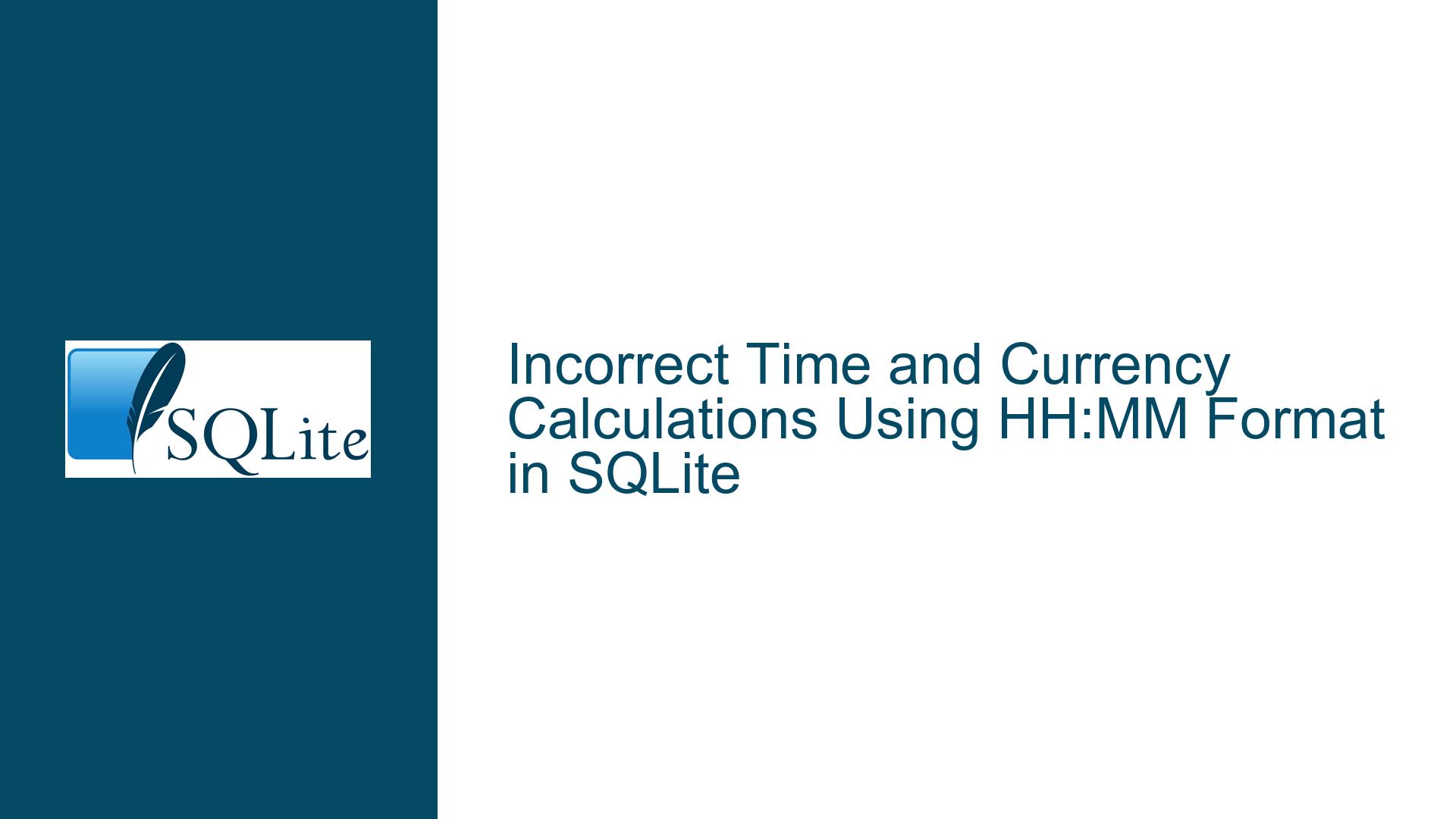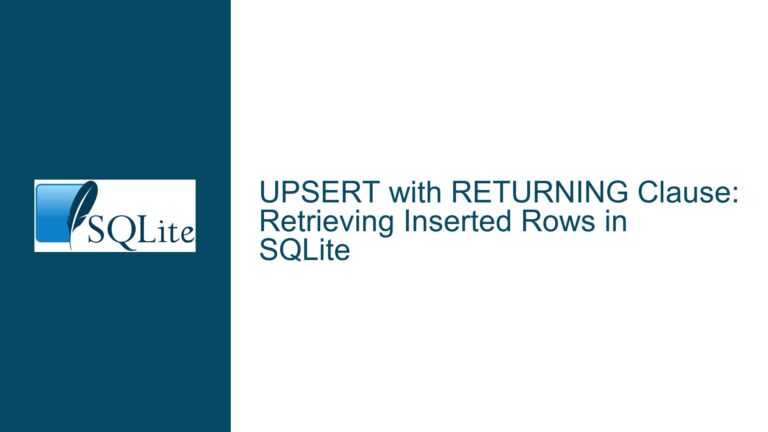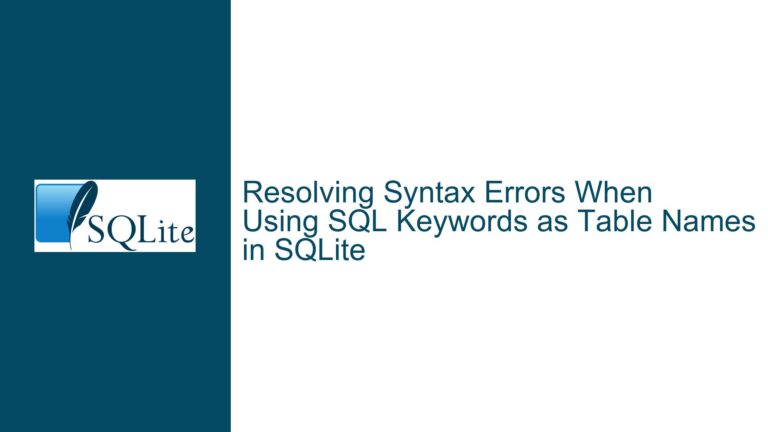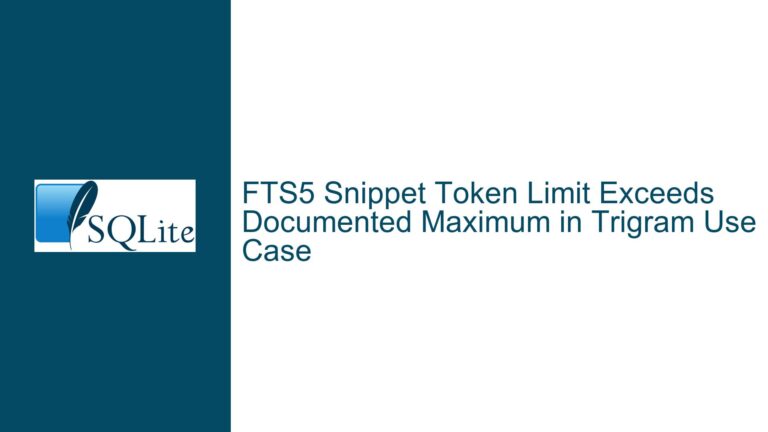Incorrect Time and Currency Calculations Using HH:MM Format in SQLite
Understanding the Core Calculation Error and Storage Missteps
The central issue revolves around attempting to multiply a time duration formatted as HH:MM (e.g., '05:30') by a numeric value (e.g., an hourly rate of 11.44) and obtaining an incorrect result due to SQLite’s type conversion rules. The root cause lies in SQLite’s interpretation of the HH:MM string as a numeric value during arithmetic operations, coupled with improper storage of temporal and monetary values.
Key Observations From the Erroneous Query
The original query:
SELECT 11.44 * '05:30'; -- Returns 57.2 instead of expected 62.92
fails because SQLite converts the string '05:30' to a numeric value by parsing digits until the first non-numeric character (the colon :), resulting in 05 (interpreted as 5). The calculation becomes 11.44 * 5 = 57.2, not 11.44 * 5.5 = 62.92. This exposes two critical issues:
- Implicit Type Conversion Pitfalls: SQLite’s loose typing system silently converts strings to integers/floats during arithmetic operations, truncating at the first non-numeric character.
- Misrepresentation of Temporal Data: Storing durations as
HH:MMstrings without proper normalization or leveraging SQLite’s datetime functions leads to incorrect calculations.
Root Causes of Calculation Errors and Design Flaws
1. Type Conversion Ambiguity With Temporal Strings
SQLite performs context-dependent conversions:
- Numeric Contexts: When a string is used in a numeric operation (e.g., multiplication), SQLite converts it to an integer or float by reading leading digits until a non-numeric character is encountered. For
'05:30', this results in5, ignoring the minutes entirely. - DateTime Contexts: When using datetime functions (e.g.,
strftime,unixepoch), strings are parsed according to SQLite’s datetime formats. However, ad-hoc strings like'05:30'are not automatically recognized as durations unless explicitly handled.
2. Improper Storage of Temporal and Monetary Data
- Temporal Values as Strings: Storing time durations or timestamps as
HH:MMstrings bypasses SQLite’s datetime functionality, forcing manual parsing and increasing error risk. - Floating-Point Currency Values: Using
REAL/FLOATfor monetary calculations introduces rounding errors (e.g.,11.44cannot be represented exactly in binary floating-point). This violates financial computation best practices.
3. Lack of Native Duration Arithmetic Support
SQLite lacks built-in functions for duration arithmetic (e.g., multiplying intervals by scalars). While datetime functions can calculate differences between timestamps, they are not natively designed for direct duration manipulation.
Comprehensive Solutions for Accurate Calculations and Robust Schemas
1. Correctly Converting HH:MM Durations to Decimal Hours
Method 1: String Manipulation
Split the HH:MM string into hours and minutes, then convert to decimal:
SELECT 11.44 * (
CAST(SUBSTR('05:30', 1, 2) AS REAL) + -- Hours: '05' → 5
CAST(SUBSTR('05:30', 4, 2) AS REAL) / 60 -- Minutes: '30' → 0.5
) AS total; -- 11.44 * 5.5 = 62.92
Advantages: Works in all SQLite versions; no datetime functions required.
Limitations: Fragile if input format varies (e.g., '5:3' instead of '05:03').
Method 2: Leveraging DateTime Functions
Convert the duration to seconds since a fixed point, then derive decimal hours:
SELECT 11.44 * (
(unixepoch('1970-01-01 ' || '05:30') - unixepoch('1970-01-01 00:00')) / 3600.0
) AS total; -- 11.44 * 5.5 = 62.92
Steps Explained:
- Anchor to Epoch: Pad
'05:30'to a full datetime string ('1970-01-01 05:30') to ensure parsing. - Calculate Seconds Difference: Use
unixepoch()to get seconds since 1970-01-01 00:00:00 UTC. - Convert to Hours: Divide by
3600to get decimal hours (19800 seconds / 3600 = 5.5).
Advantages: Robust against irregular time formats; handles daylight saving changes if UTC is used.
Limitations: Requires SQLite 3.38.0+ (2022-02-22) for unixepoch().
2. Best Practices for Storing Temporal Data
Schema Design for Shift Tracking
Store start and end times as UTC datetime strings:
CREATE TABLE shifts (
id INTEGER PRIMARY KEY,
employee_id INTEGER,
start_time TEXT, -- ISO8601 format: 'YYYY-MM-DD HH:MM'
end_time TEXT,
CHECK (start_time <= end_time)
);
Example Insertion:
INSERT INTO shifts VALUES
(1, 101, '2024-06-01 09:00', '2024-06-01 17:30'); -- 8.5 hours
Calculating Duration in Decimal Hours
Use datetime functions to compute intervals:
SELECT
(unixepoch(end_time) - unixepoch(start_time)) / 3600.0 AS hours_worked
FROM shifts
WHERE id = 1; -- Returns 8.5
Handling Overnight Shifts:
-- Shift from 22:00 to 03:00 (5 hours)
INSERT INTO shifts VALUES
(2, 101, '2024-06-01 22:00', '2024-06-02 03:00');
SELECT
(unixepoch(end_time) - unixepoch(start_time)) / 3600.0 AS hours_worked
FROM shifts
WHERE id = 2; -- Returns 5.0
3. Precise Monetary Calculations Using Integer Cents
Schema Design for Currency
Store amounts as integers representing cents to avoid floating-point inaccuracies:
CREATE TABLE earnings (
shift_id INTEGER PRIMARY KEY,
cents_earned INTEGER, -- $11.44 → 1144 cents
FOREIGN KEY (shift_id) REFERENCES shifts(id)
);
Calculating Earnings Accurately
Join shifts with hourly rates and compute using integer arithmetic:
-- Hourly rate: $11.44 → 1144 cents
INSERT INTO earnings (shift_id, cents_earned)
SELECT
s.id,
CAST((unixepoch(end_time) - unixepoch(start_time)) * 1144 / 3600 AS INTEGER)
FROM shifts s
WHERE s.id = 1; -- 8.5 hours * 1144 → 9724 cents ($97.24)
Rounding Strategy: Use CAST(... AS INTEGER) to truncate fractions of a cent. For banker’s rounding, adjust the calculation:
CAST((... + 0.5) AS INTEGER) -- Round halves up
4. Backward-Compatible Solutions for Older SQLite Versions
Calculating Seconds Without unixepoch()
Use strftime('%s', ...) if unixepoch() is unavailable:
SELECT
(CAST(strftime('%s', end_time) AS REAL) -
CAST(strftime('%s', start_time) AS REAL)) / 3600 AS hours_worked
FROM shifts;
Handling Time Strings Without Date Components
For HH:MM strings without dates, anchor them to an arbitrary date:
SELECT
(strftime('%s', '2000-01-01 ' || '05:30') -
strftime('%s', '2000-01-01 00:00')) / 3600.0; -- 5.5
5. Advanced Techniques for Production Systems
Time Zone Awareness
Store all datetimes in UTC and convert to local time in application logic:
INSERT INTO shifts VALUES
(3, 101, '2024-06-01 09:00+00', '2024-06-01 17:30+00');
Validation Constraints
Enforce valid time formats directly in the schema:
CREATE TABLE shifts (
...
CHECK (start_time GLOB '????-??-?? ??:??' AND
end_time GLOB '????-??-?? ??:??')
);
Indexing for Performance
Create indexes on datetime columns for fast range queries:
CREATE INDEX idx_shifts_start ON shifts(start_time);
CREATE INDEX idx_shifts_end ON shifts(end_time);
Conclusion: Building a Robust Time and Earnings Tracker
By adopting these strategies, you ensure accurate calculations and future-proof your application:
- Store Temporal Data as UTC Datetimes: Enables precise duration calculations and handles overnight shifts.
- Use Integer Cents for Currency: Eliminates floating-point errors and ensures financial integrity.
- Leverage SQLite’s Datetime Functions: Avoid manual string parsing and utilize built-in optimizations.
- Validate and Index Temporal Data: Maintains data quality and query performance.
Implementing these best practices will transform your tracking system from an error-prone prototype into a reliable production-grade application.






